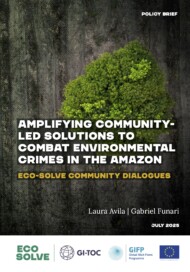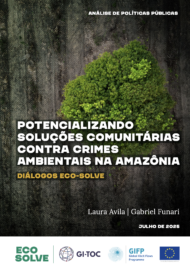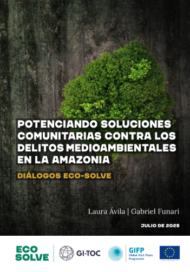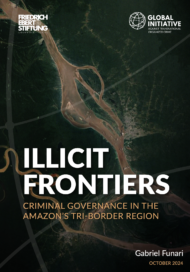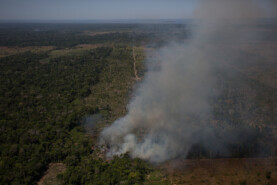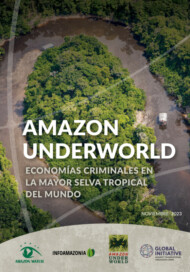Global attention to the environmental challenges facing the Amazon has increased ahead of the upcoming United Nations Climate Change Conference (COP30), which will take place in Belém, the capital of Pará state in the Brazilian Amazon, in November 2025.
This moment offers a rare opportunity to position the voices of the Amazon’s environmental defenders at the centre of policy discussions around the intersecting environmental and human security crises facing what is one of the most critical biomes for global conversation efforts.
As front-line defenders of the rainforest, Indigenous, quilombola (maroon) and riverine leaders have a deep understanding of the illicit economies, capacity shortfalls and extractive pressures affecting the Amazon. Their insights are essential to building more legitimate and effective responses to environmental crime.
This policy brief is the outcome of a two-day ECO-SOLVE community dialogue organized by the Global Initiative Against Transnational Organized Crime (GI-TOC). Bringing together leaders from across the Brazilian states of Pará and Acre, the dialogue prioritized lived experience over elite narratives and grounded expertise over technical abstraction. The result is a set of community-informed findings and policy recommendations aimed at shifting how governments, donors and multilateral actors engage with the Amazon region.
One of the clearest messages to emerge from the dialogue is that efforts to protect the Amazon rainforest are systematically hindered by relationships with state authorities. Participants described widespread police violence and systemic impunity for environmental violations.
They also pointed to how private sector actors, particularly agribusiness and infrastructure developers, exploit legal loopholes and weak consultation processes to expand into Indigenous and traditional territories. Far from isolated issues, these patterns reflect a broader political economy in which cycles of violence and community exploitation empower environmental criminals to expand across the Amazon.
Yet the dialogue was not only a diagnosis of harm. Participants offered a powerful reframing of nature and territory – not as commodities, but as interconnected systems of life, knowledge and identity. They shared strategies that they are already implementing to counter environmental crime in the Amazon, including community policing and sustainable development initiatives.
These are not symbolic gestures, but are scalable models for prevention, resilience and justice that call out for international support. Participants called for deeper inclusion in policymaking spaces, including at COP30. They also proposed reforms to Brazil’s consultation laws, new federal interventions in areas overrun by environmental crime, and increased investment in community-led alternatives to environmentally harmful economic activities. Additionally, they emphasized the urgent need for harsher penalties for environmental violations and specialized training for law enforcement and prosecutors working in the Amazon.
In amplifying these demands, this brief supports a community-driven blueprint to rebalance power and restore justice in the world’s most vital rainforest.
La atención mundial a los desafíos ambientales que enfrenta la Amazonia ha aumentado de cara a la próxima Conferencia de las Naciones Unidas sobre el Cambio Climático (COP30), que tendrá lugar en Belém, capital del estado de Pará, en la Amazonia brasileña, en noviembre de 2025.
Este momento representa una oportunidad poco común para situar las voces de quienes defienden el medio ambiente en la Amazonia en el centro de los debates políticos sobre las crisis ambientales y de seguridad humana que se cruzan en uno de los biomas más importantes para los esfuerzos de conservación global.
Como defensores de primera línea de la selva tropical, los líderes indígenas, quilombolas (comunidades afrodescendientes) y ribereños tienen un conocimiento profundo de las economías ilícitas, las carencias de capacidad institucional y las presiones extractivas que afectan a la Amazonia. Sus perspectivas son esenciales para construir respuestas más legítimas y eficaces frente al crimen ambiental.
Este informe de políticas es el resultado de un diálogo comunitario de dos días organizado por la Iniciativa Global contra el Crimen Organizado Transnacional (GI-TOC) en el marco de ECO-SOLVE. Reunió a líderes de los estados brasileños de Pará y Acre, priorizando las experiencias vividas por encima de los relatos de las élites y el conocimiento práctico por encima de la abstracción técnica. El resultado es un conjunto de hallazgos y recomendaciones de políticas informadas por las comunidades, destinadas a transformar la manera en que los gobiernos, donantes y actores multilaterales se relacionan con la región amazónica.
Uno de los mensajes más claros que surgió del diálogo es que los esfuerzos para proteger la selva amazónica se ven obstaculizados sistemáticamente por la relación con las autoridades estatales. Los participantes denunciaron una violencia policial generalizada y una impunidad sistémica frente a las violaciones ambientales.
También señalaron cómo actores del sector privado, en particular el agronegocio y los desarrolladores de infraestructura, aprovechan vacíos legales y procesos de consulta débiles para expandirse hacia territorios indígenas y tradicionales. Lejos de ser problemas aislados, estos patrones reflejan una economía política más amplia en la que ciclos de violencia y explotación comunitaria permiten que los criminales ambientales se expandan por toda la Amazonia.
Sin embargo, el diálogo no fue solo un diagnóstico del daño. Los participantes ofrecieron una poderosa redefinición de la naturaleza y el territorio: no como mercancías, sino como sistemas interconectados de vida, conocimiento e identidad. Compartieron estrategias que ya están implementando para combatir el crimen ambiental en la Amazonia, incluidas iniciativas de vigilancia comunitaria y desarrollo sostenible.
Estas no son acciones simbólicas, sino modelos escalables de prevención, resiliencia y justicia que requieren apoyo internacional. Los participantes pidieron una inclusión más profunda en los espacios de formulación de políticas, incluida la COP30. También propusieron reformas a las leyes de consulta en Brasil, nuevas intervenciones federales en zonas tomadas por el crimen ambiental e inversiones más amplias en alternativas lideradas por comunidades frente a actividades económicas perjudiciales para el medio ambiente. Además, enfatizaron la necesidad urgente de sanciones más severas por violaciones ambientales y de capacitación especializada para las fuerzas de seguridad y fiscales que trabajan en la Amazonia.
Al amplificar estas demandas, este informe respalda un plan impulsado por las comunidades para reequilibrar el poder y restaurar la justicia en la selva tropical más importante del mundo.
A atenção global aos desafios ambientais enfrentados pela Amazônia aumentou com a aproximação da próxima Conferência das Nações Unidas sobre Mudança do Clima (COP30), que acontecerá em Belém, capital do estado do Pará, na Amazônia brasileira, em novembro de 2025.
Este momento representa uma oportunidade rara de colocar as vozes dos defensores ambientais da Amazônia no centro das discussões políticas sobre as crises ambientais e de segurança humana que se entrelaçam em um dos biomas mais importantes para os esforços globais de conservação.
Como defensores de linha de frente da floresta tropical, líderes indígenas, quilombolas e ribeirinhos têm um conhecimento profundo sobre as economias ilícitas, as falhas de capacidade institucional e as pressões extrativas que afetam a Amazônia. Seus pontos de vista são essenciais para construir respostas mais legítimas e eficazes ao crime ambiental.
Este policy brief é resultado de um diálogo comunitário de dois dias, organizado pela Iniciativa Global contra o Crime Organizado Transnacional (GI-TOC) no âmbito do ECO-SOLVE. Reunindo líderes dos estados brasileiros do Pará e do Acre, o diálogo priorizou a experiência vivida sobre as narrativas das elites e o conhecimento prático sobre a abstração técnica. O resultado é um conjunto de achados e recomendações de políticas informadas pelas comunidades, voltadas a transformar a forma como governos, doadores e atores multilaterais se relacionam com a região amazônica.
Uma das mensagens mais fortes que emergiu do diálogo é que os esforços para proteger a floresta amazônica são sistematicamente prejudicados pelas relações com as autoridades estatais. Os participantes relataram violência policial generalizada e impunidade sistêmica diante de violações ambientais.
Eles também apontaram como atores do setor privado, especialmente do agronegócio e da infraestrutura, exploram brechas legais e processos de consulta frágeis para expandir suas atividades em territórios indígenas e tradicionais. Longe de serem questões isoladas, esses padrões refletem uma economia política mais ampla, na qual ciclos de violência e exploração comunitária fortalecem criminosos ambientais que avançam por toda a Amazônia.
No entanto, o diálogo não foi apenas um diagnóstico de danos. Os participantes apresentaram uma poderosa ressignificação da natureza e do território — não como mercadorias, mas como sistemas interconectados de vida, conhecimento e identidade. Compartilharam estratégias que já estão implementando para combater o crime ambiental na Amazônia, incluindo policiamento comunitário e iniciativas de desenvolvimento sustentável.
Essas não são ações simbólicas, mas modelos escaláveis de prevenção, resiliência e justiça que clamam por apoio internacional. Os participantes pediram maior inclusão nos espaços de formulação de políticas, incluindo a COP30. Também propuseram reformas nas leis de consulta no Brasil, novas intervenções federais em áreas dominadas pelo crime ambiental e mais investimentos em alternativas econômicas sustentáveis lideradas por comunidades. Além disso, destacaram a necessidade urgente de penas mais severas para crimes ambientais e de treinamento especializado para as forças de segurança e promotores que atuam na Amazônia.
Ao amplificar essas demandas, este documento apoia um plano comunitário para reequilibrar o poder e restaurar a justiça na floresta tropical mais vital do planeta.
